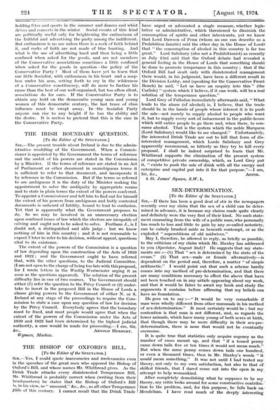THE BISHOP OF OXFORD'S BILL.
[To the Editor of the SPECTATOR.]
Sin,—Yes, I could quote inaccuracies and irrelevancies even in the speeches 'of the great men who opposed the Bishop of Oxford's Bill, and whose names Mr. Whitbread gives. As the Drink Trade attacks every disinterested Temperance Bill, Mr. Whitbread is probably correct when (writing from their headquarters) he states that the Bishop of Oxford's Bill is, in his view, as" unsound," &c., &c., as all other Temperance Bills of this century. I cannot recall that the Drink Trade
have urged or advocated a single measure, whether legis- lative or administrative, which threatened to diminish the consumption of spirits and other intoxicants, yet we know that Lord Dawson of Penn (whom no one can describe as a Prohibition fanatic) said the other day in the House of Lords that "the consumption of alcohol in this country is far too great." Lord Salisbury (also not a Prohibitionist) as recently as July 23rd said that the Oxford debate had revealed a general feeling in the House of Lords that something should be done to promote temperance in this country ; that if the Oxford Bill had dealt only with disinterested management there would, in his judgment, have been a different result in the Division Lobby, and (speaking for the Conservative Front Bench) he said, "Let us have an enquiry into this" (the Carlisle) "system which I believe, if it can work, will be a real solution of the temperance question."
Lord Grey of Fallodon immediately afterwards said, "What leads to the abuse (of alcohol) is, I believe, that the trade should be in the hands of people whose interest it is to push the sale—not merely to supply alcohol to people who want it, but to supply every sort of inducement in the public-house which will entice people to go there and, when there, to con- sume alcohol. That is the system which the noble Marquess (Lord Salisbury) would like to see changed." Unfortunately, the interested Drink Trade are out to kill that form of dis- interested management, which Lords Salisbury and Grey apparently recommend, as bitterly as they try to kill every proposal. I shall be indeed surprised to learn that Mr. Whitbread supports the elimination of the present system of competitive private ownership, which, as Lord Grey put it, "exists to push the sale of drink with all the energy and enterprise and capital put into it for that purpose."—I am,


































 Previous page
Previous page